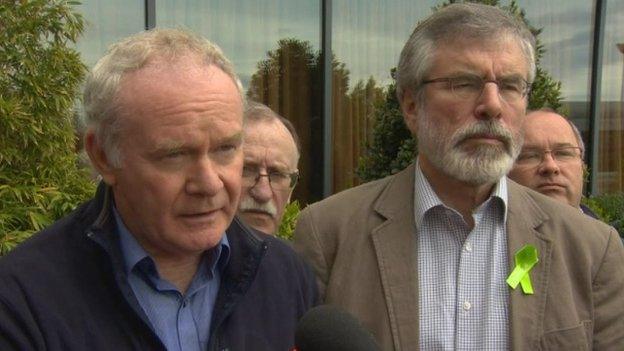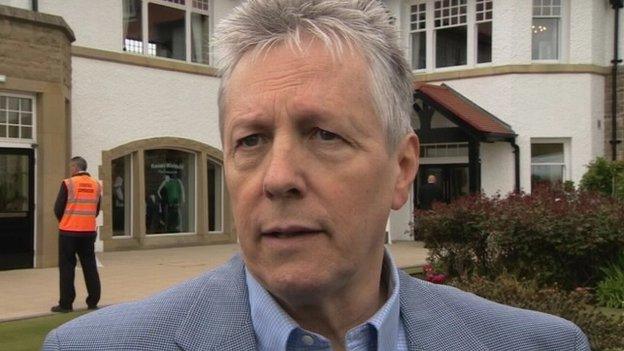Welfare reform: Sinn Féin's Martin McGuinness warns of 'grave' situation
- Published

Sinn Féin's ard chomhairle (national executive) met in Dublin in Saturday to discuss what they described as the "developing crisis" over welfare reform in Northern Ireland
Northern Ireland's deputy first minister has described the political situation at Stormont as "very grave" due to the row over welfare reform.
Sinn Féin's Martin McGuinness was speaking ahead of Saturday's meeting by his party's ard chomhairle (national executive) to discuss the crisis.
He said he was told the UK government plans to impose £12bn in welfare cuts.
He said Tory ministers plan a further £13bn in cuts across UK government departments.
'Folly'
The issue of welfare reform and its impact on Northern Ireland's budget has caused serious political difficulties at Stormont in recent years.
The crisis deepened earlier this week when the Welfare Bill was blocked by Sinn Féin, the SDLP and the Green Party's only MLA.
The welfare legislation was an important part of last December's Stormont House Agreement, and would have provided a number of mitigation measures to protect people on benefits who may otherwise lose out under planned welfare changes.
Some of the reforms are already in force in other parts of the UK, but speaking ahead of this party's meeting in Dublin, Mr McGuinness said Northern Ireland was different from the rest of the UK.
"I am not prepared to reside over the austerity agenda that the British government are inflicting on our executive. My conscience would not allow me to do it.
"So I think what we have to do is rally the forces, both in Dublin, in the United State of America, and make it clear to David Cameron that this approach is folly of the worst kind," he said.
'Loss of life'
But First Minister Peter Robinson, who leads the Democratic Unionist Party (DUP), said there would be no renegotiation of the Stormont House Agreement.

Peter Robinson was interviewed at the Irish Open golf tournament in County Down, in his first public appearance after a suffering a heart attack last Monday
He warned that failing to implement welfare reform would result in "£600m of cuts to vital public services".
Mr Robinson was interviewed at the Irish Open golf tournament, during his first public appearance since suffering heart attack last Monday.
"I've had the experience of being in hospital, talking to medical staff, knowing the difficulties that they're facing, the fact that without the funds that they presently have there would be loss of life, it would be an issue for public safety," Mr Robinson said.
"So, we do have to deal with all of these issues, but if they can't be dealt with then Her Majesty's government is going to have to step in and deal with them themselves."
On Wednesday, Northern Ireland Secretary of State Theresa Villiers said she could not rule out Westminster having to step in to legislate on welfare matters in Northern Ireland.